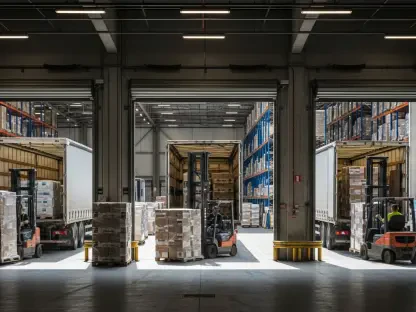Introduction to a Critical Air Cargo Challenge
In the fast-paced world of global logistics, a sudden disruption can send shockwaves through supply chains, especially during the high-stakes holiday season. FedEx, a cornerstone of air cargo delivery, faces an unprecedented hurdle with the grounding of its Boeing MD-11 fleet, prompted by serious safety concerns after a tragic incident involving a similar aircraft operated by a competitor. This crisis, affecting a significant portion of FedEx’s operational capacity, raises pressing questions about how the company will maintain its service commitments during peak demand. The stakes are high, as delays or disruptions could impact retailers and consumers alike. This summary delves into FedEx’s strategic response, exploring the measures taken to navigate this challenge and the broader implications for the air cargo industry.
Background of the MD-11 Fleet Grounding
The grounding of the MD-11 fleet stems from a critical safety directive issued by the Federal Aviation Administration (FAA) earlier this month, following a fatal crash involving a UPS aircraft of the same model. Boeing, the manufacturer, recommended halting operations until thorough inspections and necessary repairs could be completed, a move swiftly enforced by regulatory authorities. This decision underscores a non-negotiable commitment to safety, prioritizing it above operational continuity in light of potential risks identified in the aircraft’s systems.
For FedEx, the impact is substantial, as the company operates 28 MD-11 aircraft, with 18 dedicated to domestic routes. These planes are integral to both national and international shipping, connecting key hubs across South China, Tokyo, Shanghai, London, and Osaka. The grounding disrupts a critical lifeline for time-sensitive cargo, amplifying the urgency of finding alternative solutions amidst rising holiday shipping volumes.
The broader significance of this issue extends beyond a single company, casting a spotlight on vulnerabilities within the air cargo sector. With peak season demand already straining capacity, the temporary loss of these aircraft could create cascading delays across the industry, affecting retailers reliant on expedited services. Safety remains the guiding principle, but the timing of this crisis adds layers of complexity to an already challenging landscape.
FedEx’s Strategic Response to the Crisis
Contingency Plans to Mitigate Disruptions
In response to the grounding, FedEx has rolled out a multifaceted contingency plan to minimize service interruptions. As outlined by John Dietrich, EVP and CFO, during a recent industry conference, the company is tapping into spare aircraft to fill immediate gaps in capacity. Additionally, FedEx is leveraging its extensive ground transportation network to reroute domestic shipments where feasible, ensuring that packages continue to move despite the absence of key air assets.
Beyond internal resources, FedEx has forged partnerships with commercial airlift providers to secure additional lift capacity. This collaborative approach aims to bridge the shortfall caused by the grounded fleet, particularly for international routes where substitutions are more challenging. The company also stands ready to adjust maintenance schedules for other aircraft in its fleet, a flexible strategy designed to maintain service levels without compromising safety standards.
Inspection Timeline and Operational Recovery
The process of returning the MD-11 fleet to service began recently, with inspections conducted on an aircraft-by-aircraft basis. This tailored approach, as reported by industry analysts, allows cleared planes to resume operations incrementally rather than waiting for the entire fleet to be evaluated. Such a method prioritizes efficiency, aiming to restore partial capacity as quickly as possible while adhering to stringent safety protocols mandated by regulators.
However, uncertainty looms over the duration of the grounding. Whether this remains a short-term setback or extends into a mid-term disruption is unclear, creating ambiguity around when full operational strength will be regained. FedEx is working closely with Boeing and regulatory bodies to expedite the process, but the timeline remains a critical variable that could shape the extent of service impacts in the coming weeks.
Implications for Customers and the Industry
The grounding poses significant risks to air cargo services, particularly for time-sensitive offerings like two-day air shipping, which are vital during the holiday peak. Supply chain advisors have warned that prolonged disruptions could force FedEx to impose restrictions on such services, potentially affecting retailers who depend on rapid delivery to meet consumer expectations. This concern is especially acute given the timing, as holiday demand surges create little room for error.
Comparatively, the impact varies between domestic and international operations. While domestic routes, similar to those operated by UPS, may be easier to substitute with alternative aircraft or ground transport, FedEx’s international corridors face greater challenges due to longer distances and limited options. If the grounding persists, the strain on capacity could ripple through global supply chains, underscoring the interconnected nature of modern logistics.
Reflections on Challenges and Resilience
Navigating Logistical Hurdles
The logistical obstacles presented by the MD-11 grounding are formidable, with capacity constraints threatening to derail FedEx’s ability to meet heightened demand. The holiday rush amplifies these difficulties, as every delay risks disappointing customers and straining retailer partnerships. Balancing the need for swift action with the imperative of safety compliance adds further complexity to an already intricate situation.
FedEx has demonstrated proactive engagement by collaborating with Boeing and regulators to address the issue head-on. A recent high-level meeting between CEO Raj Subramaniam and Boeing executives highlights this commitment to finding rapid, effective solutions. Through strategic planning and resource allocation, the company aims to weather this storm, though the scale of the challenge remains a test of operational agility.
Uncertainties and Long-Term Considerations
Looking ahead, the unresolved duration of the grounding introduces lingering uncertainties about its lasting effects on FedEx’s operations. Customer trust, a cornerstone of the logistics industry, could be tested if disruptions escalate or persist beyond initial expectations. The potential for recurring safety concerns with aging fleets also looms as a broader issue that may require systemic attention.
Future focus areas include strengthening fleet safety protocols to prevent similar crises and exploring sustainable capacity solutions, such as diversifying aircraft types or enhancing ground-based alternatives. These steps could bolster resilience against unforeseen disruptions, ensuring that FedEx remains a reliable partner in global shipping even under adverse conditions.
Conclusion: Lessons Learned and Paths Forward
Looking back, the grounding of the MD-11 fleet challenged FedEx to balance stringent safety mandates with the pressing demands of operational continuity. The company’s swift deployment of contingency measures, from spare aircraft to ground network adjustments, showcased a determined effort to mitigate disruptions during a critical period. Yet, the uncertainty surrounding the timeline of full fleet restoration left lingering concerns about capacity and service reliability.
Moving forward, actionable steps emerged as vital considerations. FedEx, alongside industry stakeholders, should invest in advanced safety monitoring systems to preempt potential fleet issues, reducing the likelihood of future groundings. Exploring long-term fleet modernization could also provide a buffer against similar crises, ensuring operational stability. Finally, fostering stronger partnerships with alternative transport providers offers a practical avenue to enhance flexibility, safeguarding service commitments even in turbulent times. This episode highlighted the fragility of air cargo systems under pressure, urging a proactive stance to fortify resilience for the road ahead.









